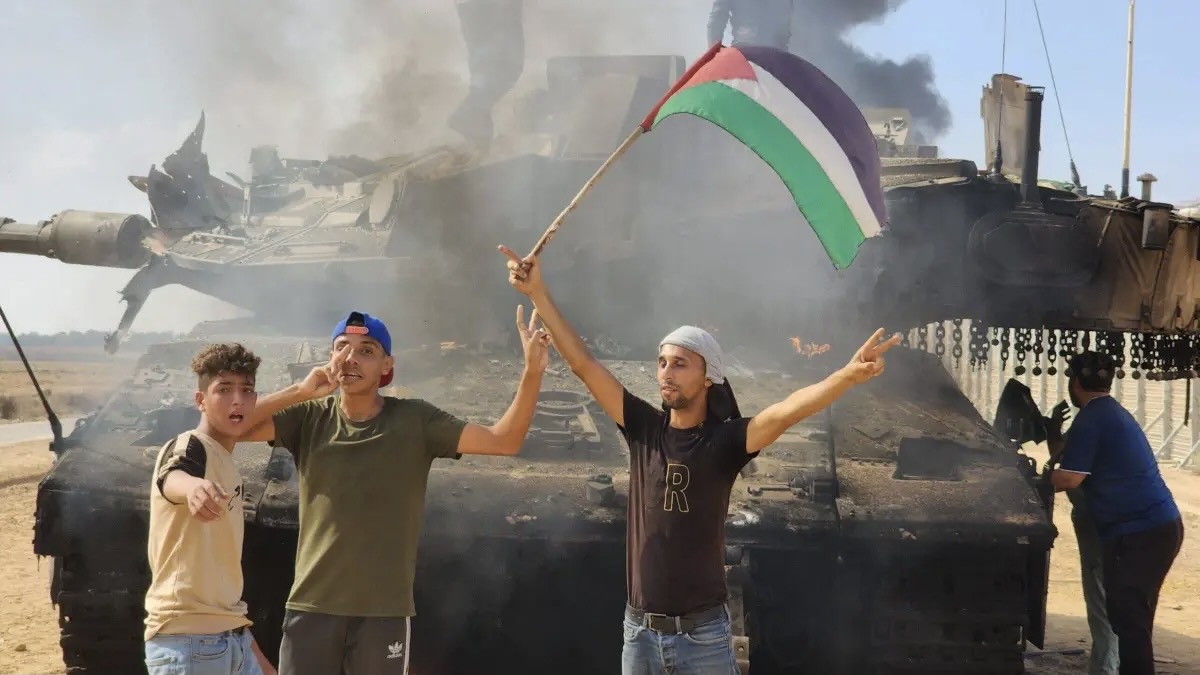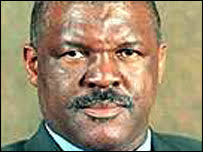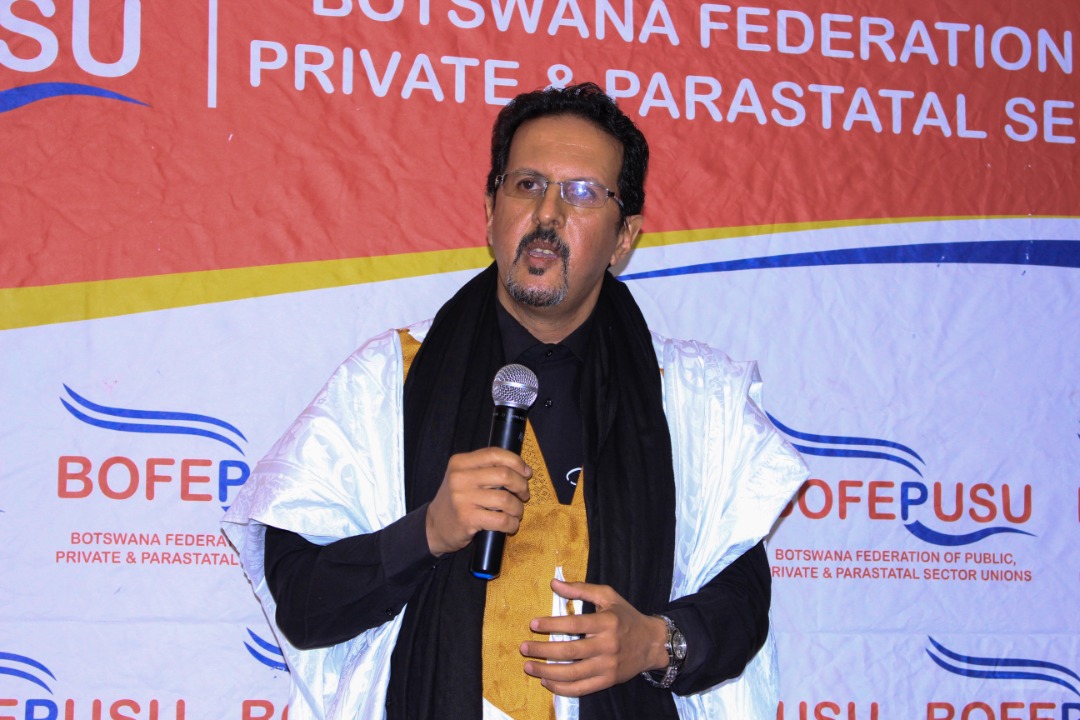
Gaza-operation-al-aqsa-flood.j (pic. Peoples Dispatch)
by Cde M.K Mafa
In today’s global landscape, many Christians, particularly in Africa, are told that Israel is a “holy land” and the rightful homeland of the Jewish people.
This narrative carries significant emotional and spiritual weight but often overlooks the harsh realities faced by Palestinian people, including their historical ties to the land and their ongoing struggles for rights and recognition.

This article aims to provide a comprehensive understanding of these complex issues and foster a more informed perspective among Christians regarding the multifaceted situation surrounding Israel and Palestine.
To understand the modern implications of the Israeli narrative, we must first recognize the historical figure of Jesus Christ.
Jesus was born in Bethlehem around 4–6 BCE and raised in Nazareth, both located in what is today known as Palestine.
According to the New Testament, Jesus lived in a predominantly Jewish region under Roman occupation, which involved interactions with diverse ethnic and religious groups, including Jews, Samaritans, and Romans.
This context highlights that Jesus should not be confined to a modern Israeli identity. He is part of a rich Palestinian heritage with deep roots in the land.
His mission emphasized love, compassion, and justice, principles that resonate with many struggles for rights and equality today.
Furthermore, many Palestinian Christians today trace their lineage back to the early followers of Jesus, underscoring the continuity of Christianity in the region long before the establishment of the modern Israeli state.
Historically, the region has witnessed harmonious coexistence among various faiths. During the Ottoman Empire (1517–1917), Christians, Muslims, and Jews lived and worked together, fostering an environment of cultural exchange and interfaith dialogue.
Reports from the British Mandate in 1922 indicated that approximately 60% of the population was Muslim, 30% Christian, and 10% Jewish—demonstrating the diversity of the region before the 1948 Arab-Israeli War.
More recently, the interfaith relationships reflect a spirit of collaboration that has often been overshadowed by contemporary conflict narratives.
Before the establishment of Israel, many Palestinian communities hosted and interacted positively with their Jewish neighbours, further illustrating a complex interwoven history that predated the current tensions.
The Israeli government and various pro-Israel organizations frequently appeal to emotional and religious sentiments to garner support, especially from Christians who feel a spiritual connection to the land.
The Christian Zionist movement has promoted the belief that the return of Jews to Israel fulfills biblical prophecy, intensified by key historical events such as the Six-Day War in 1967 when Israel captured East Jerusalem, Gaza, the West Bank, the Golan Heights, and the Sinai Peninsula.
In this context, evangelical support for Israel has translated into substantial financial backing for pro-Israel initiatives, with estimates suggesting that U.S. Christian Zionist groups contribute over $1 billion annually to Israel.
A notable example is the International Fellowship of Christians and Jews, which raises tens of millions of dollars each year to support Israeli social programs and Jewish causes.
However, these narratives often ignore the plight of Palestinians, whose rights and voices are frequently overshadowed.
When faced with criticisms regarding its policies toward Palestinians, Israel often invokes accusations of anti-Semitism as a protective measure.
For example, the Anti-Defamation League (ADL) reported significant increases in anti-Semitic incidents, implying that any critique of Israeli practices may harbour underlying hatred towards Jews.
This tactic complicates discussions surrounding Israel’s human rights record, framing Israel as a perpetual victim and preventing nuanced dialogue regarding the realities of occupation and inherent injustices.
The rise of anti-Semitism in various parts of the world does require a serious consideration of how anti-Jewish hatred can be used to stifle essential discussions about oppression.
However, conflating legitimate criticism of Israeli actions with anti-Semitism can hinder crucial conversations about justice and equality for all involved.
Many Christians often accept pro-Israel narratives due to a lack of comprehensive understanding about the broader historical and political context of the Israeli-Palestinian conflict.
A survey conducted by the Pew Research Center in 2019 revealed that while 82% of African Christians express a strong connection to Israel, only a small percentage had a grasp of the historical and contemporary issues related to Palestinian rights.
This gap in knowledge can perpetuate misconceptions and prevent a deeper dialogue about justice. Influential leaders within Christianity frequently promote a one-sided perspective connected to their theological beliefs without adequately addressing the injustices faced by Palestinians, leaving many unaware of the full scope of suffering and displacement occurring in the region.
Israel often presents itself as a benefactor to African nations, providing aid in various fields such as agriculture, technology, and military assistance. However, many argue this aid is often self-serving and strategically motivated.
For instance, in 2020, Israel signed military cooperation agreements with several African states, highlighting a focus on security collaboration over humanitarian development.
While Israel’s agricultural assistance programs, including extensive support to countries like Uganda and Ethiopia, have improved farming technologies, they often prioritize Israeli companies and technologies over local farmers.
In Uganda, an estimated 30% of agricultural investments are linked to Israeli companies, raising concerns about land use and local farmer rights.
Reports indicate that while Israeli agricultural expertise might increase crop yields, it can also lead to a dependency on imported technologies and undermine local farming practices, ultimately affecting the economic stability and food sovereignty of local communities.
African nations and regional organizations, such as the African Union (AU), have historically played a critical role in supporting Palestinian rights.
The AU has been vocal in recognizing Palestinian statehood in alignment with the broader global agenda promoting justice.
For instance, the organization reaffirmed its commitment to Palestinian rights at its 2020 summits, demanding an end to Israeli occupation and supporting Palestine’s right to self-determination.
However, to amplify these voices and commitments, African leaders must strengthen diplomatic and humanitarian ties with Palestinian authorities.
Involvement in international forums, such as the United Nations, can provide a platform for African states to advocate for a fair resolution to the Israeli-Palestinian conflict, urging Israel to comply with international law.
For African Christians, it is crucial to view the struggles of Palestinians as part of a broader narrative of human rights and justice, rather than solely through a religious lens.
The experiences of African nations—including their own struggles against colonialism and apartheid—parallel the Palestinian fight for rights and self-determination.
For example, movements like Boycott, Divestment, and Sanctions (BDS) have gained significant traction among advocacy groups worldwide.
Initially launched in 2005 by over 170 Palestinian organizations, BDS seeks to apply nonviolent pressure on Israel to comply with international law regarding Palestinian rights.
The campaign has garnered support globally, with endorsements from more than 1,700 organizations as of 2023, including many civil society groups in Africa.
The parallels between BDS and historical African anti-apartheid movements offer a foundation for solidarity among African Christians and their Palestinian counterparts, reinforcing the idea that the fight for justice is interconnected and universal.
African Christians and leaders can express solidarity with Palestinians by actively advocating for justice, promoting peace-building efforts, and creating avenues for grassroots dialogue.
Initiatives such as cultural exchanges, collaborative charitable projects, and educational programs can foster deeper understanding and shared advocacy for justice and equality.
For example, South Africa’s unique historical context as a nation that endured apartheid provides a lens for solidarity with Palestine.
The South African government officially recognizes Palestine as a state and has consistently advocated for Palestinian rights in international arenas.
Organizations like the South African BDS Coalition mobilize public support for Palestinian rights, raising awareness of the parallels between the struggles for liberation in both regions.
Furthermore, African churches can play a vital role in promoting awareness of Palestinian issues within their congregations, emphasizing social justice and humane treatment for all.
Collaborative efforts within ecumenical movements can foster unity among churches on the African continent in their shared commitment to justice for the oppressed.
By critically examining the myths surrounding Israel and recognizing the legitimate struggles of Palestinians, Christians in Africa can develop a more nuanced understanding of the situation.
This knowledge helps shift the narrative from a solely religious perspective to one rooted in justice and human rights.
Solidarity movements that bridge the African experience with the Palestinian struggle can create a powerful alliance for justice and self-determination.
African Christians have a unique opportunity to stand in solidarity with their Palestinian brothers and sisters, demonstrating that faith can drive advocacy for justice and equality.
As they support one another, African Christians and Palestinians can work toward a future built on respect, dignity, and peace for all.
By fostering dialogue, promoting awareness, and advocating for human rights, they can contribute to a narrative of hope that profoundly impacts both regions and the global community.
- Mafa Kwanisai Mafa is the National Chairperson of Zimbabwe Palestine Solidarity Council
(C) TPA2024








